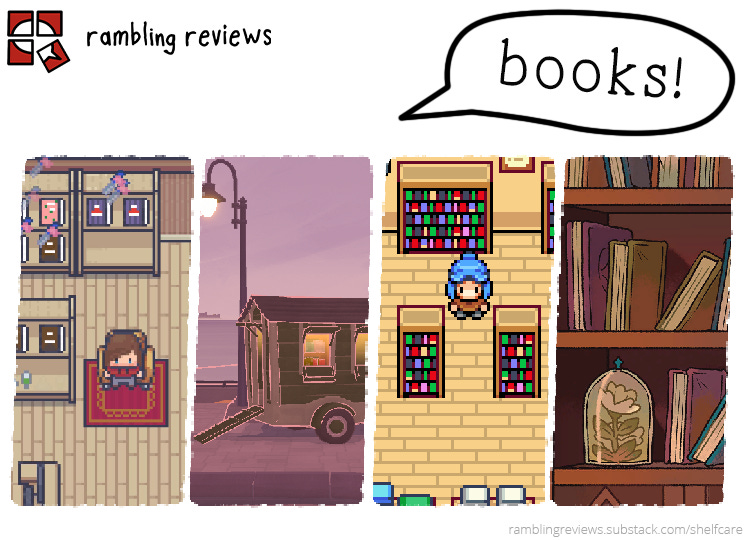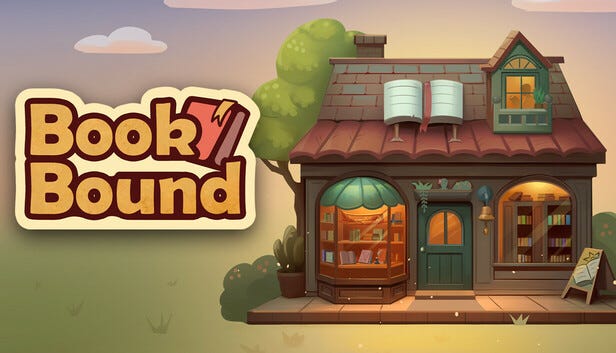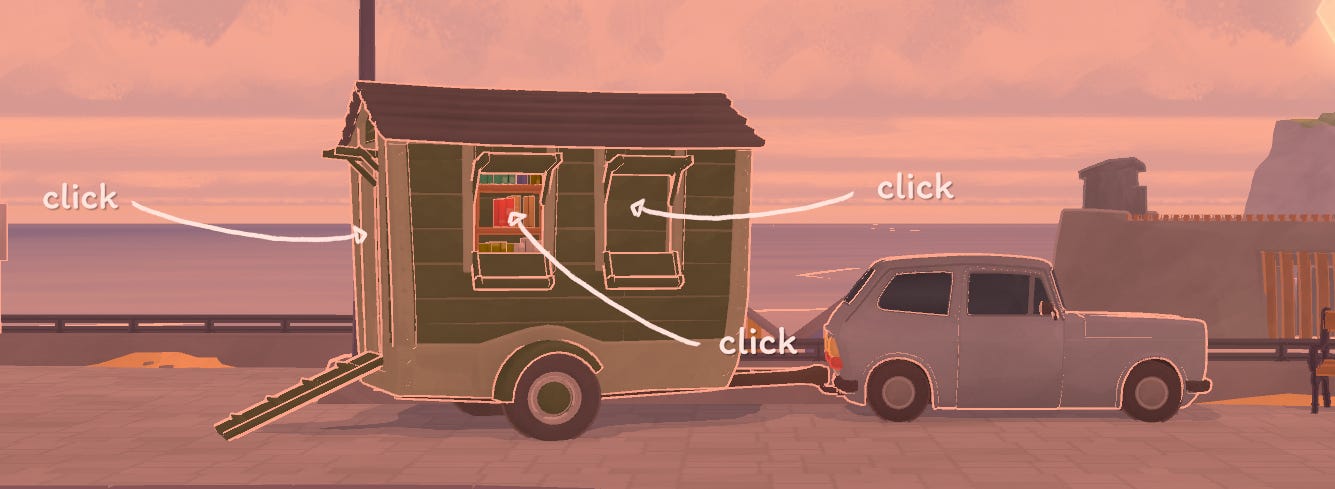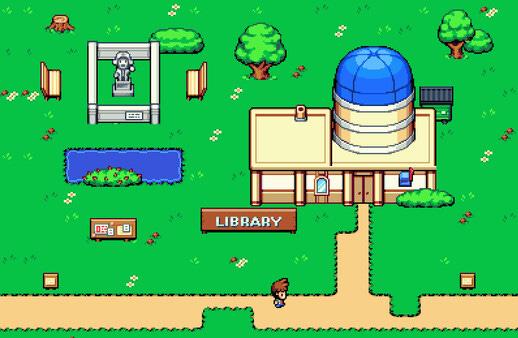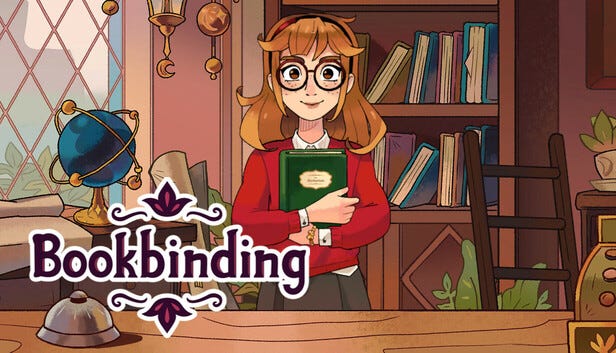Page-turners and papercuts.
Dusting off some bookish games from my library for all your s(h)elf-care needs.
Last week, I spent most of my time playing two games that couldn’t be more different from each other. They each deserve their own blog post and they mostl likely will get that once they are in a further state of development.
On the one hand, I was being very thorough in playtesting Whimside, an incredibly gorgeous sort-of creature collector game that sort-of idles at the bottom of your screen.
I can’t say too much about it yet, just that it’s one of those games that you have to try out when it releases, because it’s just that inexplicably cute. I can’t do the charm justice with any human words. The goal is to collect not the creatures themselves per se, but their different parts, which you can mix and match through breeding to create the ultimate Whimling, which in my personal and unbiased opinion just happens to look a whole lot like a bunch of rabbits in all kinds of different colours.
The other half of my week, I was obsessed with Schedule I, a simulator game in which you manufacture and deal drugs - usually not my kind of thing, but somehow it absolutely works in this game.
You start with a single weed plant in your uncle’s old RV and work your way up to manufacturing harder and higher quality drugs, employing dealers and other employees to exploit help you with the manufacturing process and distribution of your drug empire. All of this happens in a city with a curfew enforced by incredibly easy to fool and outrun police officers. It’s quirky and funny, and ultimately, in its core, it’s just a very good, grindy resource management and logistics simulator in a crime jacket.
I realise those two games couldn’t be further apart, and I think that balance is what kept my brain so occupied all week. But how did we get from there to books, then? Well, while playing Whimside, one of my points of feedback was about (not) being able to rotate furniture in the base-building bit of the game. One of the other playtesters mentioned that the way furniture works in Whimside reminds them of how it is in another game they play, Book Bound, and that was enough for me to go check it out, and get absolutely obsessed with book games for the rest of the week, of course.
Are they page-turners, or do they give you metaphorical paper cuts?
Read on to find out!
Book Bound
Sadly, Book Bound was hard to review.
On the one hand, it’s super cosy, the graphics are gorgeous, I love the bookshop theme, the loop is addictive enough, and there are interesting mechanics like pulling in customers by talking to them or using a megaphone, and helping them find the right shelf.
On the other hand, cleaning up the trash annoys me more than it should, and those absolute barbarians randomly drop books on the floor, which pulls me out of the cosy immersion a little. The game could really use a few quality of life improvements. For example, you need 50 inspiration to unlock something, but there’s no number on your inspiration meter. You just have to... guesstimate? And even when it is full, it wasn’t clear what I had to do until I randomly clicked on it. So yeah, some guidance would be nice.
But most importantly: it is incredibly slow.
The loop has to repeat a lot before you unlock something new. When you finally do, it gets interesting. Suddenly you can get a computer and write your own book, unlock new decorations tied to different book themes, and your creative juices start flowing as you decorate little genre-specific corners of the shop. That’s great, but getting there involves a lot of repetition - restocking shelves, ordering books, helping customers, cleaning up, picking up dropped books… and it gets tedious. Adding a chapter to your book is quite expensive, too, in terms of the inspiration you need for it.
I definitely didn’t WANT to give this game a negative review, because it is extremely cosy, refreshing, and clearly made with a lot of passion and love. It has all the elements of being a great game, it just needs a little more time in the oven. It feels like early access - but it isn’t, and that's a shame. That’s why I reluctantly gave it a negative review, If Steam had neutral reviews, I’d give it one of those instead.
😐 I genuinely hope to see a big update for this game, I would more than happily revisit it.
Tiny Bookshop
The Tiny Bookshop demo is more what I’m talking about!
I’m already sold on the menu alone. A gorgeous art style, cosy vibe and natural transition into the intro of the game made me hopeful that the rest of the game would be presented with the same level of love, care and eye for detail - and it didn’t disappoint!
The way information is presented and text is made part of a moving scene rather than having boring square boxes of it, is truly immersive. It’s an artsy hand-drawn and intuitive style, a creative work of art that truly shows how much love and dedication went into this game.
That said, it is a very slow game. In a good way! There is no “fast-forward through the day at 4x speed” button. You have to chill out, relax and observe what happens to your quaint little bookshop. It’s one of those games that makes you grab a blanket and a hot cocoa or tea, and just relax at the pace of the gameplay, making your Sundays just that little bit extra cosy.
It’s technically a management game, but you don’t manage much. The customers come in, look around, and their percentual chance of buying something is calculated by their personal interests and the amount and variety of books (in terms of genres) you have in stock. Don’t go into it expecting a bustling resource management game where you scoot around cleaning up, actively selling things, rining up customers, etc. This is not that kind of game.
What it is instead is a cosy, relaxing type of game that thrives on daily preparation. Through the visual representation of a newspaper, you learn things like what weather it is going to be, which locations are going to have special events, and which second-hand books are for sale. Additionally, there are little decorative items you can buy, which come with their own buffs and debuffs, e.g. a quaint little cactus that boosts your chance of selling a Travel book by 2%. Some items may buff one genre but debuff another, or cost more in daily upkeep, prompting you to manage your decorations and finances accordingly.
The loop is quite chill, cosy and straight-forward: you buy a box of those books to replenish your stock, and then drive up to the bustling locations that are currently hot and trending (costing you money to drive up there and get a parking permit, of course). The game features plenty of gorgeous location to open your shop, and just hanging out greeting the customers is a special type of cosy. Specific customers in your shop also give buffs and debuffs.
Sometimes, customers will ask for assistance on their purchases. They’ll explain their interests and what they’re looking for, and you get to browse the bookshelves to find what suits them best. The books are irl books, meaning your personal background in reading is actually beneficial to the gameplay! The game provides enough information on authors, themes and genres, so no worries if you aren’t an avid reader (yet). Browsing through these novels might actually change that!
While guests are doing their thing, you can look around and click on things. I can’t express how excited I was finding that, not only can I pick up items to display in my shop, I can also click the animals and they will make their cute little sounds or give you love!
Bonus points: some of the customers are in wheelchairs. It isn’t mentioned, it isn’t a buff or debuff, it’s just inclusive. I love that so much!
👍 Doing the bookshop genre absolutely right, looking forward to this game!
Little Library
Little Library‘s promotional image doesn’t quite reflect the vibe it’s putting down in-game, so let me get that obstacle out of the way by plopping down a screenshot from their Steam page right here:
There. Do you feel it? That utter nostalgia pulling you back to the beginning of the nineties, when you were first playing Pokémon? It hits that spot quite well, doesn’t it? The game aims at putting down that nostalgic, retro feel, and I’m genuinely not sure why it doesn’t reflect that in its banners and promotional material. It’s a good thing to lead with!
The Little Library demo starts on a bit of a bummer - Mayor Henry welcomes you to town, thanks you for taking the position as librarian in their newly built library (so far so good), but then goes on to explain that it was the COVID lockdowns that diminished the community spirit in their village, and I can’t help but worry that the game is going to be “like that”. I personally think living through the pandemic was dramatic enough, I don’t necessarily need it in my fictional escapes, especially not cosy library sims. Furthermore, that point is immediately made redundant by the villagers actually being cosy, telling you they love their community and are committed to making it a cosy place once more, so where exactly is this lack of community spirit? The backstory needs some work, for sure. Sometimes a good old “your uncle died and left the farm to you” does the trick.
The game stays the retro course, but a little too much when the controls are arrow keys instead of WASD. Other than that, it takes to the typical farming simulator “go meet the villagers first” trope, which I personally like because I otherwise don’t put in the social effort. The farming sim vibe is confirmed when you walk past a little field on your way to the village, and I’m curious to see how that will be integrated into the librarian life.
There are some small and less small annoyances:
Entering someone’s house, getting a little cut scene with the NPCs coming over to introduce themselves, but then being booted out of the house, so you have to go back in to actually look at the house and talk to the villagers.
Some of the dialogue refers to other NPCs by the wrong name (e.g. Lily saying she appreciates “Lily’s eye for detail” when she means Ava, and Ava saying “Ava is quick to volunteer”, when she means Lily).
Going down a road that clearly leads downwards, expecting that to transition into a different map, but it just being a wall, while the road on the other end of the screen does exactly that.
The collision boxes are… weird. You can slide in behind a building that looks like a full block, but can’t walk in front of a sign that takes up half a block of space. You can’t walk through a perfectly empty square behind your desk chair. Some trees/bushes are walk-through, some aren’t. In some of the NPC houses, you can walk through the inside walls.
Introducing yourself to villagers sometimes gives +15 relationship with them, and sometimes it gives only +10. Not sure if it’s an inconsistency or a poorly explained choice.
I’m willing to write these things off as “it’s still a demo, they’ll be improved in the full version”, though.
What bothers me more is that the game tells you you will have to do certain things, like shelf books, help customers, clean the floor, familiarise yourself with book titles, authors and genres (which, by the way, seem to be irl books so that’s interesting!) but doesn’t show you how to do it. I went through a day of librarianism and it was just… waiting for the day to be over, then getting a -2 penalty because I didn’t clean the floor while I didn’t see anything to clean or didn’t know how to clean it in the first place.
After the day was done, I couldn’t immediately reopen the library, which is fine, but there is no indication whatsoever of what time of the day it is. I have a stamina meter on my screen, but it seems full so not sure what else there is to do. I just went home to sleep and then turned off the game.
👎 Interesting idea that was poorly executed.
Bookbinding
I am so excited about reviewing Bookbinding!
First things first: it doesn’t officially have a demo yet, that is still in development and will release in June. What I am playing is a very early dev build / prototype that I am extremely grateful to have gotten an early peek at.
The playtest introduces the core mechanics of the game: you own a bookbinding / restoration shop, and customers come to you with their journals, old books, etc. that they want restored. They’ll give you some guidelines, e.g. “it’s a gift for my grandmother, she likes bees” or “it’s a grimoire, and I don’t like bright colours”. You then get to redesign the book, deciding on the colour and the art that goes on the cover.
It’s a game concept that shines in its simplicity and thrives on its creative freedom. It reminds me of Sticky Business, a game where you run a sticker shop and get to design stickers using the building parts you unlock by selling more stickers! Both games have a strong storytelling component. Your customers each have backstories and personalities, likes and dislikes, and as you build your professional relationship with them, they’ll reveal more of themselves. I wouldn’t be surprised if in Bookbinding, just like in Sticky Business, the player will end up fixing a lot of personal issues for the customers, and I am genuinely looking forward to it!
👍 Definitely wishlist Bookbinding on Steam, I am confident it’ll be wonderfully gorgeous!
You’ve probably already felt some of my mild frustration shine through in this blog post, as I feel there is so much potential for good library/bookshop games, though the market is utterly undersaturated.
A game like Book Bound has so much potential, it breaks my heart that it doesn’t quite hit the mark. Books are lovely, books are amazing, books are so incredibly cosy that it baffles me that they aren’t a more common topic for cute, cosy games.
Thankfully, as you’ve seen in this post, the future is looking bright for this underrated topic, and a few good games are coming soon. We just have to be patient, and our patience will hopefully be rewarded with great games.
I definitely can’t wait, can you?
Rambling Reviews is now on Discord! Join us to hype about games, too!






